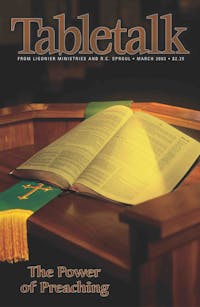
Request your free, three-month trial to Tabletalk magazine. You’ll receive the print issue monthly and gain immediate digital access to decades of archives. This trial is risk-free. No credit card required.
Try Tabletalk NowAlready receive Tabletalk magazine every month?
Verify your email address to gain unlimited access.
“To preach or not to preach, that is the question. Whether ‘tis nobler in the pew to suffer the slings and arrows of outrageous sermons, or to take arms against a sea of troubling homilies. . . . To sleep: perchance to daydream.” Maybe Hamlet didn’t say exactly that in his famous soliloquy, but such musings are no doubt familiar to many evangelicals sitting in pews, or possibly in folding chairs or beanbags. Most evangelicals I know are quick to criticize the sermons of their preachers. For lunch, instead of the usual soup and salad, many partake of roasted pastor, with some sautéed worship leader on the side.
But it is perhaps unfair to assign the title preacher to those who prefer to offer what they call “weekend messages” or “Sunday morning talks” instead of sermons established upon the Word of God. A possible reason for the criticism is that many pastors are seemingly more concerned with delivering personal reflections and socio-cultural anecdotes than they are with delivering unchanging truths from God’s unchanging Word. We live in a time when the preaching of the Word and living out the Word have become secondary, taking their places at the back of the stage, under the spot lights, beside the percussion section.
In reaction to the pervasive apathy toward preaching the Word, and in response to those who are under the impression that the task of seminary preaching courses is to teach future pastors how to talk so that people will listen, Dr. John MacArthur and the faculty of The Master’s Seminary have written a book designed to motivate and equip “this and the next generation of Christian leaders to provide wholesome spiritual nourishment for God’s people from His Word.” The 410-page volume, Rediscovering Expository Preaching, published by W Publishing Group, is a helpful guide for pastors and ministerial students; its approach is straightforward and its emphasis is appropriately ecclesiastical.
The fourfold aim of the book is “to clarify the need for and meaning of expository preaching”; “to verify the theological and historical demand for expository preaching”; “to specify the essential elements and steps involved in preparation for and participation in expository preaching”; and “to exemplify the reality of expository preaching.”
Rediscovering Expository Preaching does not offer a quick remedy for Biblical preaching but aims to instruct pastors and laypeople as to the primacy of the Word. It explains that legitimate preaching is necessarily grounded in Scripture, demonstrating that such preaching does not stray from its authoritative foundation into casual conversation or dramatic performance accompanied by tap-dancing, but, on the contrary, lives, moves, and has its being in the living and active Word of God.
One author, in studying the history of expository preaching, considers John Calvin’s concern for the ministry of the preached Word. He writes, “The evidence of his sincerity was a life spent expounding God’s Word.” He also quotes Calvin on the centrality of preaching: “Wherever we see the Word of God purely preached and heard … it is not to be doubted, a church of God exists.” He is saying that a church cannot be defined primarily by its programs, personnel, and playgrounds, but must be defined by its faithfulness to the Word of God.
The book also takes pains to urge preachers to live out their message. Whereas in times past, pastors were heralded as ministers of the Word, it is today the unfortunate case that many pastors are neither embraced as ministers of the Word nor regarded as holy men of God; indeed, the two traits are necessarily inseparable. The title reverend is rightly appropriate; an ordained minister of the Word is one whose life exhibits holiness. On this point, MacArthur writes: “Righteousness and godliness are together the two indispensable qualities of a man of God, and yet they are his life long pursuit. They are central to his usefulness; they are at the core of his power. He possesses them and yet pursues them (cf. Phil. 3:7–16). An unsanctified preacher is useless to God, and a danger to himself and people.”
Rediscovering Expository Preaching is recommended to Christians who perceive the need for Biblical preaching, not as a listed feature to a church’s advertisement in the phone book, but as part of the church’s essential constitution. To preach the Word or not to preach the Word—that really is the question. If the Word is not proclaimed, the church will starve, and if the Lord’s Day sermon is based upon a late-night impulse or a midweek whim, the whole counsel of God will be supplanted.
As the royal priesthood and holy nation of God, it is certainly the case that complaint and criticism have no place in the church. Thus, where the divinely inspired and authoritative Word is preached, our doubts abate, our criticisms cease, and our musings subside.
